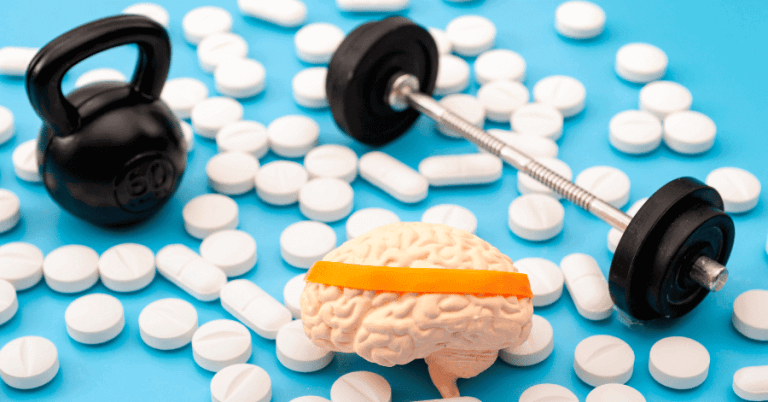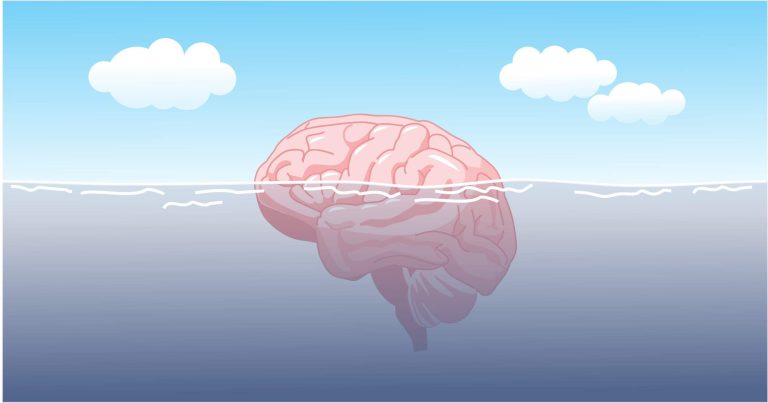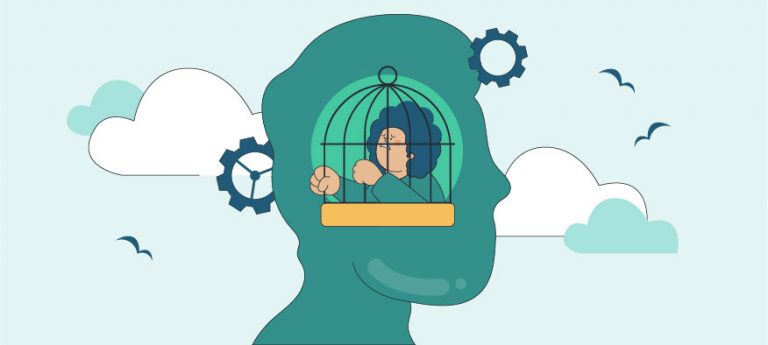Tony Stark, also known as the fictional Iron Man, had super intelligence that allowed him to design and build advanced armored suits and numerous cutting-edge technologies, making him one of the most formidable superheroes in the Marvel Universe. I’m sure we could all do with being a little more like Mr. Stark.
Enter the world of Nootropics, compounds that claim to improve cognitive functions such as attention, memory, focus, and creativity. Colloquially known as smart drugs, immense interest now surrounds the field as a way to work harder and smarter.
While a peculiar name, nootropic consists of two Greek words nöos, which means thinking, and tropein, which means to guide. Hence the belief that nootropics can help guide and manage your thoughts for better cognitive functioning.
But do nootropics really work, or should they remain in the world of Tony Stark and science fiction? Are they worth your money and time, or are they simply a marketing gimmick?
This article will overview the controversial yet promising world of nootropics and cognitive enhancers using the latest scientific research to determine how they work, the benefits and side effects, which ones are the most promising, and whether they are worth taking for you.
What are Nootropics?
Nootropics, also known as smart drugs and cognitive enhancers, are natural or synthetic molecules that claim to improve cognitive functions such as focus, attention, memory, and creativity.
While often taken as dietary supplements or nutraceuticals (products derived from food sources with additional health benefits), they can also be pharmaceutical drugs (prescription or non-prescription). The legality and ease of access depend on regional laws.
Nootropics were originally developed to increase cognitive function in the cognitively impaired, such as those with neurodevelopmental conditions like age-related cognitive decline and attention deficit hyperactivity disorder (ADHD).
Naturally, the cognitive benefits in such disorders have piqued interest in those not impaired; studies commonly cite a number between 10-15% for consumption for non-medical reasons as a self-attempt to increase cognitive performance.
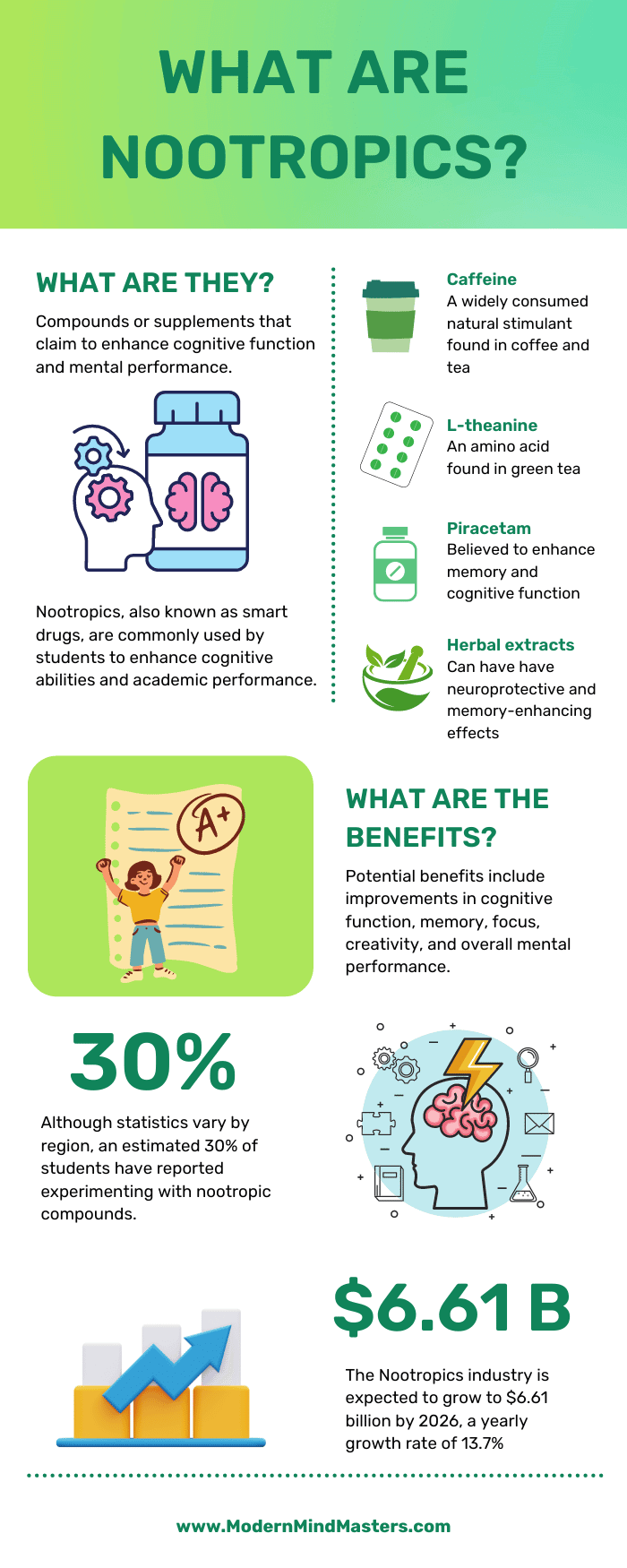
How do Nootropics Work?
Nootropics do not act by directly releasing neurotransmitters or as receptor ligands like most medical drugs. Instead, they improve the brain’s supply of glucose and oxygen, resulting in antihypoxic effects (counteract the effects of oxygen deficiencies) and protect brain tissue from neurotoxicity (the harmful effects that certain chemicals or agents can have on the brain).
Other mechanisms include neurotransmitter modulation, where chemical messengers in the brain are modulated to enhance their production and release, such as increasing levels of acetylcholine, a neurotransmitter involved in learning and memory.
The exact mechanism of action on the brain varies depending on the specific type of nootropic used.
What are the Benefits of Nootropics?
The benefits of nootropics are vast and varied, and the degree to which a person feels these benefits depends on the individual, the substance taken, and the dosage. Some of the most common benefits, however, are listed below.
- Improved cognitive function – Nootropics may enhance various aspects of cognitive performance, such as memory, learning, attention, and problem-solving abilities.
- Increased focus and concentration – Some nootropics are believed to help individuals stay more focused and attentive, potentially leading to increased productivity.
- Enhanced memory retention and recall – Nootropics may improve both short-term and long-term memory, making it easier to remember and recall information.
- Mental clarity and reduced brain fog – Users report experiencing a clearer and more organized thought process when taking certain nootropics.
- Neuroprotection – Some nootropics have been studied for their potential to protect brain cells from damage and reduce cognitive decline associated with aging or neurodegenerative diseases.
- Stress reduction – Certain nootropics may have adaptogenic properties that help the brain and body better cope with stress, promoting a calmer and more focused state of mind.
- Enhanced creativity and problem-solving – Some individuals claim that nootropics can boost creativity and help with creative thinking and problem-solving tasks.
- Improved mood and motivation – Certain nootropics may influence neurotransmitters related to mood, potentially leading to a more positive outlook and increased motivation.
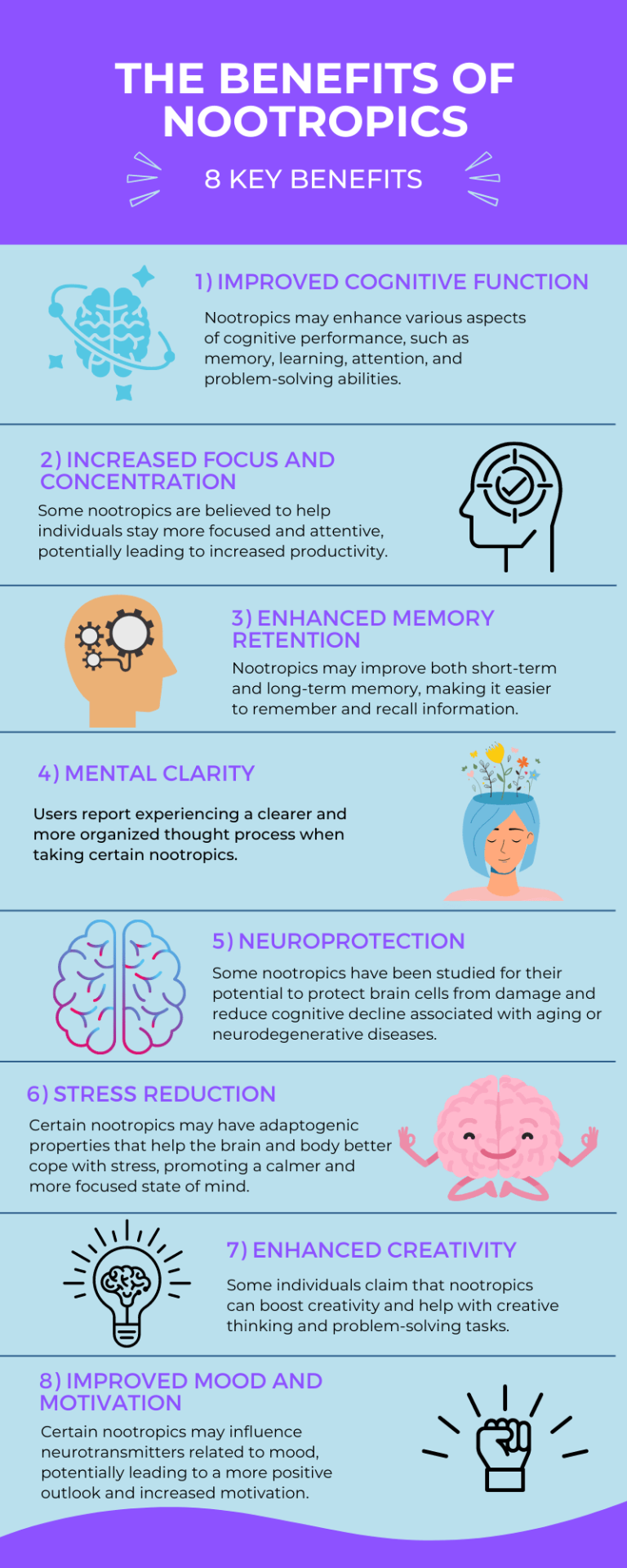
Types of Nootropics
Nootropics are a relatively new and understudied topic. As a result, there is currently no uniform or standard approach for categorizing them.
In the clinical and scientific contexts of what research has been done, however, four main types of nootropics are commonly cited: classical nootropic compounds, substances increasing brain metabolism, cholinergic compounds, and plants and their extracts with nootropic effects.
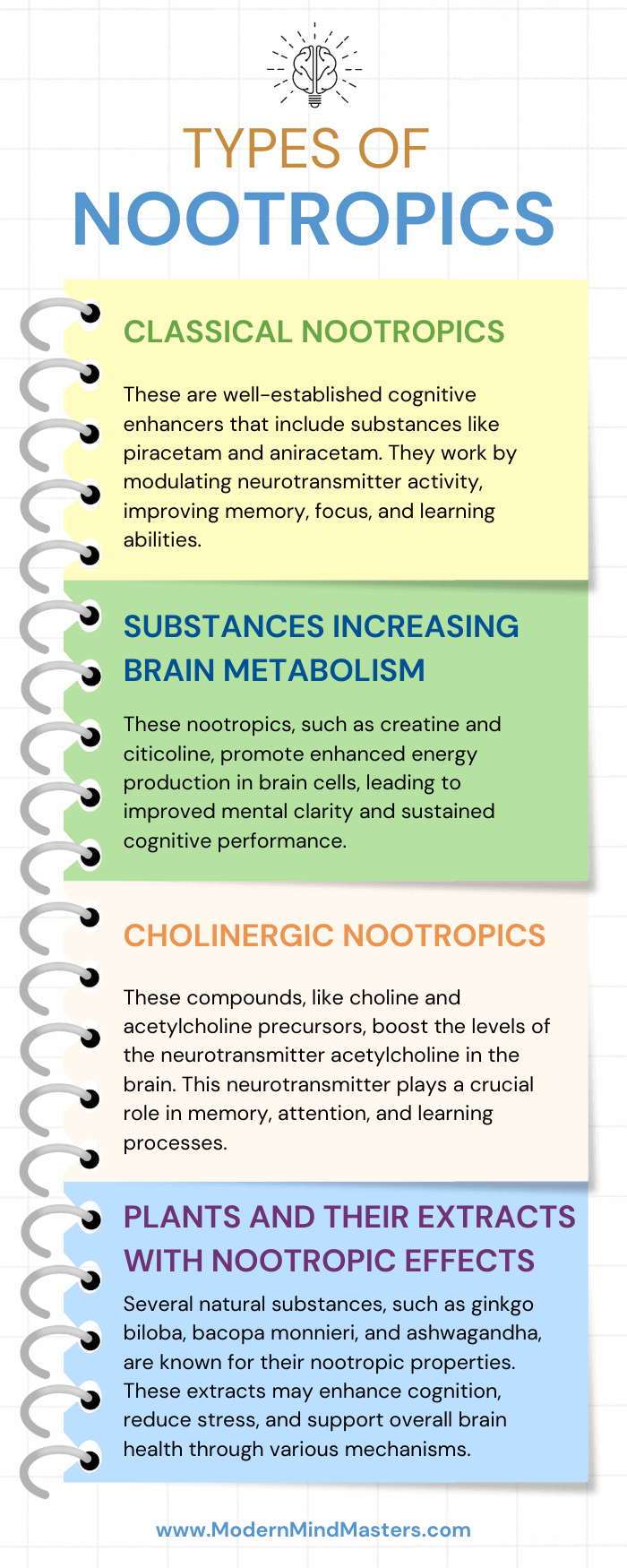
1) Classical Nootropics
Classical nootropic compounds were among the first identified for their cognitive-enhancing properties. They generally possess the ability to enhance learning and memory, act as a neuroprotective (protect brain cells from damage and promote brain health), and have minimal side effects.
Some of the most common classical nootropics include:
Deanol (DMAE)
Deanol is a dietary supplement naturally occurring in the brain but can also be obtained from certain foods like fish. DMAE optimizes the production of acetylcholine, a neurotransmitter crucial for learning and memory. Studies have suggested a daily dosage of 500–2000 mg in the form of DMAE bitartrate (a dietary supplement in capsule and powdered form).
Meclofenoxate
A derivative of DMAE, Meclofenoxate increases choline and acetylcholine levels in the brain but has been shown to be twice as effective as DMAE. It is primarily used to enhance cognitive function and has been studied for its potential benefits in memory enhancement and age-related cognitive decline.
Nicergoline
Nicergoline is an ergot alkaloid (a naturally occurring chemical compound produced by various species of fungi), previously used to treat cognitive impairment and various cerebrovascular disorders, but has also shown promise for positive effects on cognitive function. The daily dose should be 30-60 mg, and side effects may include nausea, dizziness, diarrhea, fainting, and headache.
Piracetam
Piracetam is one of the earliest and most well-known nootropic drugs. It is thought to act on brain neurotransmission through the modulation of ion channels, leading to increased neuronal excitability, oxygen consumption, and cognitive performance.
The maintenance dose is usually about 2–4 g/day, adjusted based on kidney function.
2) Nootropics Increasing Brain Metabolism
These types of nootropics work by increasing brain metabolism, increasing the rate at which the brain can process and use energy and nutrients, potentially promoting mental alertness and cognitive performance. Among the three most popular compounds are Vinpocetine, Naftidrofuryl, and Dihydroergotoxine.
Vinpocetine is derived from the periwinkle plant and has long been used as a treatment for stroke and circulatory disorders in the brain due to its potential cognitive-enhancing effects.
Naftidrofuryl and dihydroergotoxine have also proved to increase neuronal metabolism; studies on rats were shown to stimulate local glucose utilization in parts of the brain related to learning and memory.
3) Cholinergic Nootropics
It may come as no surprise that cholinergic-type nootropics primarily target the cholinergic system in the brain. These nootropics aim to enhance cholinergic activity by increasing acetylcholine, a neurotransmitter that plays a crucial role in memory, attention, and other cognitive processes.
The most common compounds in this group include acetyl-L-carnitine (a source of acetylcholine), acetyl, choline, lecithin, and pyrrolidine derivatives, all commonly found in supplements derived from soybean and sunflower oil, as well as egg yolk, liver, whole grains, and nuts.
Phosphatidylcholine
Phosphatidylcholine, also known as Lecithin, is a popular cholinergic nootropic. The results of this experiment suggested that administering phosphatidylcholine to mice in a model of dementia increased acetylcholine concentrations in the brain and improved memory.
4) Plants and Their Extracts with Nootropic Effects
Traditional medicine has long exploited the natural medicinal properties of some plants and herbs (with varying levels of success). Nootropic research has built upon this, resulting in several promising natural substances that could act as cognitive enhancers.
These natural plant-derived substances, known as phytochemicals, are currently being researched by pharmaceutical companies to find the best results with the fewest side effects.
The following list of phytochemical nootropics has all demonstrated at least some cognitive-enhancing effects:
- Ginseng (Panax ginseng) – Shows adaptogenic, antioxidant, and vasorelaxation effects. It has been studied for its potential in improving memory and cognitive function.
- Ginkgo (Ginkgo biloba) – Has antioxidant and neuroprotective effects. It is widely used for its potential benefits on cognitive function and memory.
- Asiatic Pennywort (Centella Asiatica) – Shows antioxidant, anxiolytic, and nootropic effects. It has been studied for its potential in treating Alzheimer’s disease.
- Ashwagandha (Withania somnifera) – Has potential neuroprotective effects and may improve cognitive function and memory.
- Water Hyssop (Bacopa monnieri) – Shows antioxidant and cognitive-enhancing effects. It has been studied for its potential in treating Alzheimer’s disease.
- Guarana (Paullinia cupana) – Possesses anxiolytic, panicolytic, and nootropic effects. It may improve cognitive function and memory.
- Eleuthero (Eleutherococcus senticosus) – Has antioxidant and memory-improving effects. It may enhance cognitive function.
- Rhodiola (Rhodiola rosea) – Shows neuroprotective effects and may have adaptogenic, antidepressant, and anxiolytic effects.
- Schisandra (Schisandra chinensis) – Exhibits antioxidant and neuroprotective effects, and may have cognitive-enhancing properties.
- Maca (Lepidium meyenii) – Shows potential cognitive-enhancing effects and may improve cognitive function and motor coordination.

Do Nootropics Really Work?
While science supports all of these previously mentioned compounds for their nootropic effects, do they enhance cognitive capacity in the real world? Car manufacturers frequently cite fuel consumption figures that can only be achieved in perfect test conditions: Is nootropic research any different?
The lack of thorough research on humans and the large variability in an individual’s reaction to nootropics makes this very difficult to answer.
To make matters worse, the potential to improve functioning makes nootropics of great commercial value. As a result, flocks of companies and marketers have flooded the scene. While some of these companies are legitimate, many are simply looking to make a quick buck and will twist and manipulate research and data to make nootropics seem more effective than they are.
Manufacturers’ marketing claims for dietary supplements are usually not formally tested and verified by independent entities, forcing the US Food and Drug Administration (FDA) and Federal Trade Commission (FTC) to issue warnings about possible advertising fraud and marketing scams concerning nootropic supplement products.
While much research still needs to be completed to determine the true extent of nootropic potential, a healthy skepticism is probably most useful, since no single resource can tell you if something will or will not work.
The benefits of nootropics are mild to moderate at best. Students relying on these substances will likely benefit more by ensuring they have a full night’s sleep and are well-fed. Most nootropic compounds were developed to help those with deficiencies and disorders; their effect on healthy minds are not as dramatic.
When considering nootropic use for cognitive enhancement, keep in mind that the effects are likely mild, and are easily offset by poor sleep or diet, and although nootropics are generally considered safe with infrequent side effects, very few studies have been performed on longer-term effects.
How Long Do Nootropics Last?
How long nootropics remain active depends on many factors, including the substance taken, the dosage, and individual metabolism, to name just a few.
Short-acting nootropics, such as caffeine, are commonly used for their stimulant effects and increased alertness but have a relatively short active duration of around 4-6 hours.
Intermediate-acting nootropics, such as racetams and cholinergic compounds, may have an effective period of up to half a day.
Some compounds have long-lasting effects; substances like phosphatidylserine and bacopa monnieri are believed to provide long-term benefits when taken regularly over several weeks or months.
When investigating nootropic durations, a compound’s half-life (the time taken for the concentration of the substance to decrease by half) must be taken into effect. A longer half-life may result in more sustained effects, while a shorter half-life can lead to a need for multiple doses throughout the day.
Nootropics for ADHD
Although scientific studies have shown that certain plant compounds improve attention and learning, only a few studies have been conducted to specifically address their potential effects on ADHD. While more data is needed, recent evidence and clinical experience indicate that certain herbs are beneficial as complementary and integrative treatments for ADHD.
In particular, L-theanine, omega-3 Fatty Acids such as EPA (eicosapentaenoic acid) and DHA (docosahexaenoic acid), L-carnitine, Bacopa monnieri, and Ginkgo biloba have had their effects on ADHD explored, demonstrating improvements on attention and focus in children.
Where to Buy Nootropics?
The vast majority of these substances are of natural origin and therefore do not require a prescription. They can usually be easily obtained in the form of food supplements and herbal extracts, the majority of which may be available at your local drugstore.
Almost every potential nootropic imaginable can be found online. While convenient for many, care must be taken to ensure they are bought from a reputable source (there is no shortage of people looking to make a quick buck).
Synthetic forms, the most common of which are piracetam and modafinil, are somewhat limited and difficult to obtain, often requiring a prescription.
Nootropics Side Effects
Nootropics, by their very definition, are defined as being beneficial and not detrimental. Studies have shown that they tend to be well tolerated in patients with cognitive impairments; very few studies have produced side effects, and in those that did, they were usually mild.
The main concern is that the long-term effects on healthy individuals are still unknown, a potential problem considering that most nootropics do not have an immediate effect after a single dose and require longer-term use to achieve the desired result.
Most studies come with the disclaimer that nootropics should not be used in those in pregnancy or breastfeeding. Additionally, nootropic users should consider their physical and mental health before deciding to try a certain compound; for example, those with cardiovascular disease should not use stimulants with high caffeine content.
Some people will have different reactions to different compounds, so there is no one-size fits all approach to safe nootropic use. As always, it is recommended to check in with a qualified medical professional before taking any nootropics.
Conclusion
While previously a common occurrence in science fiction, “smart drugs”, or nootropics as scientific literature now more commonly references too, are rapidly becoming an everyday tool.
While there are different types of nootropics, including classical compounds, substances increasing brain metabolism, cholinergics, and plant-derived extracts, there is currently no officially accepted categorization. As the field is still relatively understudied, and research on humans is limited, the true extent of nootropic potential is yet to be discovered.
Although research has revealed a whole host of benefits, including improving focus, memory, energy, and neural health, caution is necessary when considering nootropic use. Many companies in the market may exploit the lack of robust scientific evidence, making grand claims about their products’ efficacy. The potential benefits of nootropics are likely to be mild to moderate, and individual responses can vary significantly.
Like anything, a balanced approach to cognitive enhancement is essential; the benefits of nootropics can be easily offset by a lack of healthy lifestyle habits, such as sufficient sleep, a balanced diet, and regular exercise. Instead, they should be considered as complementary support.
While nootropics are generally considered safe with minimal side effects, long-term use on healthy individuals has not yet been studied. Pregnant or breastfeeding individuals should avoid using nootropics, and individuals with specific health conditions should exercise caution.
As the world of nootropics continues to captivate our imagination, it is crucial to approach these cognitive enhancers with both curiosity and caution. In a world full of nootropics and brain-boosting buzz, let’s remember that our most potent superpower remains the ability to think outside the pillbox!
FAQs
Are nootropics safe to take every day?
Most natural nootropics are considered safe when used as directed, but long-term research in healthy people is limited. Synthetic or prescription nootropics carry higher risks. They should complement good sleep, diet, and lifestyle—not replace them.
Do nootropics actually work?
Nootropics can help if you’re low in certain nutrients or have underlying cognitive issues, but they don’t raise your natural intelligence or push your brain beyond its normal limits. Their benefits are usually mild, and things like sleep, diet, and stress levels have a much bigger impact on cognitive performance.
Are nootropics better than caffeine for focus?
Not necessarily. Caffeine boosts alertness fast but may cause jitters or crashes. Many nootropics aim for smoother focus and memory support without overstimulation. The best choice depends on your goals and tolerance.
